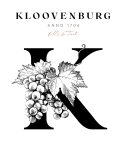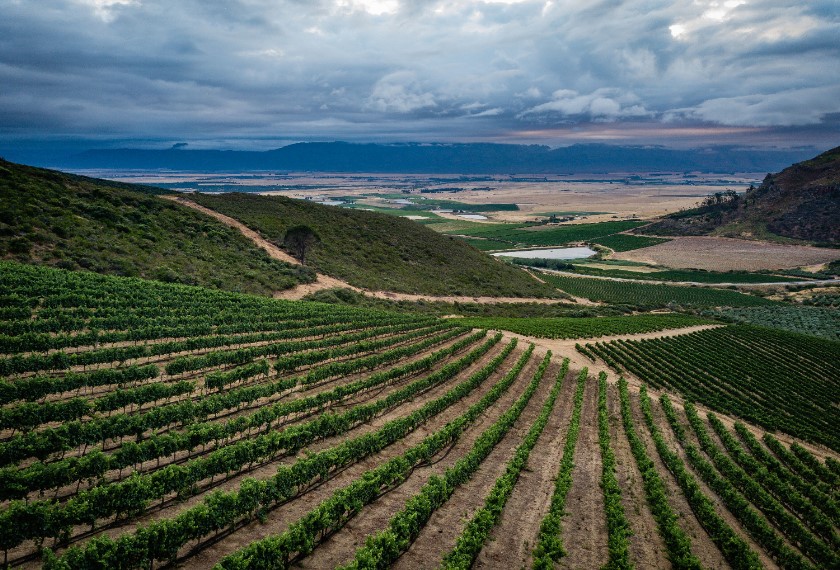
If you’ve ever visited the Riebeek Valley in the Swartland region of the Western Cape, you’ll surely remember that first vivid glimpse of the rolling hills and verdant lowlands that lie dappled in shades of gold and green as you ascend the Bothmaskloof Pass. Weaving down the hill between the tidy olive groves and neat vineyards, the next thing you may remember is a majestic copse of pine trees to your left – tall, imposing, even regal in their sentry-like location.

Kloovenburg Vineyards in the foreground with protected Renosterveld on the slopes of Kasteelberg and the greater Riebeek Valley in the distance.
Those trees are now gone.
However, contrary to popular belief, the removal of that scenic little forest is cause for celebration, because it signifies a brand-new beginning for us at Kloovenburg Wine & Olive Estate. Kloovenburg has joined forces with the World Wildlife Foundation to become a voluntary Conservation Champion with a focus on preserving the critically-endangered Swartland Shale Renosterveld and pockets of ancient Afromontane forest that lie sheltered in the ravines of Kasteelberg, a sizeable part of which forms part of Kloovenburg’s holdings.
Why is the conservation of Swartland Shale Renosterveld so important?
The world is rapidly losing its biological wealth as the result of human impact such as pollution, habitat destruction and invasion by alien plants and animals that escalate and threaten the continued existence of many species. The spread of fast-growing alien species, coupled with extensive farming in the Swartland region in particular, has resulted in this area losing most of its indigenous vegetation. This is one of the reasons why Kloovenburg chose to clear pine trees and other alien plants from their farm to allow the natural fynbos the opportunity to thrive.
Sam Mnguni, Senior Extension Officer of the WWF Fruit & Wine Programme, says that one of the biggest threats to the conservation of the remaining pockets of Swartland Renosterveld, is the fact that the land on which it grows is also perfect for commercial farming.
“Renosterveld naturally occurs in areas with fertile clay soil and relatively high rainfall, which makes it ideal farm land. Only 3% of the original Swartland Renosterveld has survived or is left intact. It’s therefore vitally important that the strips of Renosterveld that are untransformed – and often found in inaccessible areas – should be secured under various forms of protection.”
The Kloovenburg conservation philosophy
To roll out the initiative we have dedicated a 100-ha area to conservation. This includes patches of pristine Afromontane forest in the ravines within the boundaries of our estate, as well as critically-endangered Swartland Shale Renosterveld on the lower slopes of Kasteelberg. Regular visitors to these mountainous parts also include Steenbok, Baboon, Cape Leopard and Porcupines.
Our team has also made changes to the way we cultivate the land. Aside from using probes to gather data on soil moisture to manage erosion and bolstering the health of indigenous wetlands by means of responsible farming practices, we also use Geographic Information Systems (GIS) to make informed decisions when planting vines and orchards. A small, on-site composting unit has also been established to provide sufficient compost for the gardens around the tasting room and du Toit family homestead.
According to Mnguni, our eagerness to voluntarily conserve the endangered flora on our property makes us an excellent example of what a Conservation Champion should be!
”These are individuals who privately own land in under-protected, yet diverse parts of the Cape Floral Kingdom and want to ensure it is kept intact for future generations. By committing to be a Conservation Champion, Kloovenburg is committing to sustainable practices. This decision comes with some financial implications and changes in how they work, and is always commendable for anyone who is a steward of land.”
As one of WWF’s 39 Conservation Champions, an exclusive and hard-earned status, Kloovenburg can now proudly use the sugarbird and protea logo on our wine bottles. This logo demonstrates our long-term commitment to the environment and conservation of the Succulent Karoo and Cape Floral Kingdom.
Here’s to a brand-new chapter in the Kloovenburg legacy and the knowledge that, by supporting environmentally-conscious producers, we are all doing our bit to safeguard our collective natural heritage in the greater Swartland.

Aerial view of the area where invasive pine trees were cleared left of the Bothmaskloof Pass to make room for a pocket of Afromontane forest to flourish adjacent to the vineyards in the future.


Hi we love your new 8 feet village. Great initiative and when we visited today there was a constant flow of people. We see Julian is now out of his caravan and into a real coffee shop. Same great caffeine fix. Thank you. We just have a suggestion the venue is geared for volume but the staff are not yet geared for the many people. Especially the fact that people need to grab and go currently. The time we are there we would like to drink our coffee and enjoy the view andnotstandin a queue. Also love the rocks showing where to park but they are just too tight for comfort. Really just positive suggestions. We live nearby and will be back soon. Thanks Debby and David Hall